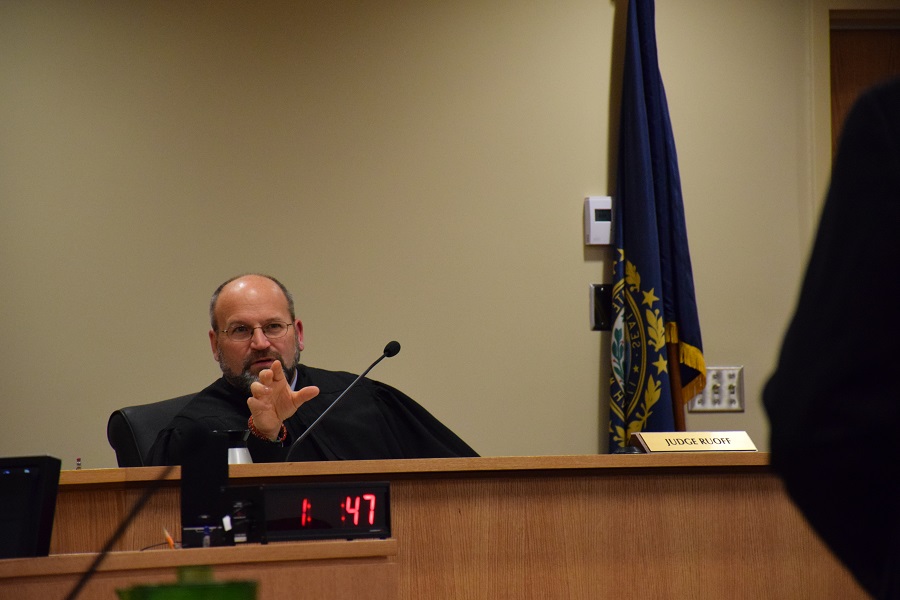By GARRY RAYNO, InDepthNH.org
BRENTWOOD — The state is asking a superior court judge to approve a motion for a ruling without a trial on the second aspect of an education funding suit filed last year against the state and how it funds and determines the cost of an adequate education.
Last week the state argued as it did in the other education funding suit, ConVal School District and others versus the state, that many school district expenses are not included in what the state pays for an adequate education for all students.
The filing in the Rand and other residential and commercial property taxpayers against the state claims the state’s definition of an adequate education that must be provided by the state is not adequately funded using the current system dependent on property taxes and the current scheme of targeted aid to cover costs required by the state.
The summary judgement motion by the state contends there is no disagreement over the facts and those facts favor the state’s argument.
In its filing, the state claims there is no dispute over the definition of an adequate education or the services needed to provide it, although the plaintiffs claim as did those in the ConVal suit, that the state requires school districts to provide students with transportation, school nurses, school facilities and their maintenance and capital costs, while the state argues they are not included in an adequate education and the state does not have to pay for them.
“We saw plenty of this disregard for the actual cost of educating New Hampshire students from the state during the ConVal trial,” said Zack Sheehan, NH School Funding Fairness Project Executive Director. “I know the state recognizes the importance of school nurses and school busses because they are required by statute, so it is wholly unreasonable for the state to suggest that these services are somehow not part of ensuring students have the opportunity to receive an adequate education.”
In its filing the state argues “The plaintiffs appear to contend that everything school districts spend money on, including transportation, capital costs, and debt, is part of constitutional adequacy that the State must pay for. The Supreme Court has made clear, however, that the duties imposed by Part II, Article 83 ‘do not prevent the legislature from authorizing local school districts to dedicate additional resources to their schools or to develop educational programs beyond those required for a constitutionally adequate education.’”
However school districts are required to transport all students between kindergarten and eighth grade who live more than two miles from their school and districts also transport high school students although the state contends that is a “local decision.”
Under the state minimum education requirements, school nurses must be present at schools, and school buildings are required and must meet safety and cleanliness standards.
The state argues those costs are not included in an adequate education and in the ConVal case argued heat and electricity costs were also not included in an adequate education.
“Without buildings, without people to maintain them, without buses, kids wouldn’t get the opportunity to be in a classroom and learn,” Sheehan said. “But the State has decided to ignore those factors and file this motion seeking a ruling that would continue the unconstitutional downshifting of billions of dollars in education costs onto local property tax payers.”
In its filing the state claims the plaintiffs bear the burden of proof that these additional costs should be included in an adequate education, but has failed to do so.
“The plaintiffs premise their adequacy claim on a theory that Part II, Article 83 requires the State to provide school districts with funding in an amount equal to or greater than the average total amount school districts spend per pupil statewide. Because this theory fails both as a matter of law and undisputed fact, the plaintiffs cannot meet their heavy burden of demonstrating that the current funding formula is in clear and substantial conflict with Part II, Article 83,” Attorney General John Formella wrote in the state’s filing.
The two sides have both argued for a summary judgement on the issue of the constitutionality of the state’s administration of the Statewide Education Property Tax (SWEPT) last month.
The plaintiffs argue by allowing property wealthy communities to retain tax money not needed to cover the adequacy grant for the school districts, and allowing other communities to have a negative school tax rate to offset the statewide property tax obligation for communities with no or few students there are effectively varying rates among communities and that is unconstitutional for a state tax.
The state claims those provisions are legislative decisions on spending and not varying effective tax rates for those communities.
Superior Court Judge David Ruoff said last month he believes the case is ripe for a summary judgement on the issue of the statewide property tax.
But the judge said he did not know if he would rule first on the summary judgement issue or the ConVal case that the state fails to pay for the true cost of an adequate education proposed to be about $10,000 per student, while the state currently pays just over $4,000 per student.
Ruoff said he would rule on one of the issues in about 60 days at the hearing on the statewide property tax which would be in the first week or two of September.
The plaintiffs have 30 days to respond to the state’s summary judgement motion in the Rand and others versus the state case.
A trial is scheduled for September.
Garry Rayno may be reached at garry.rayno@yahoo.com.





